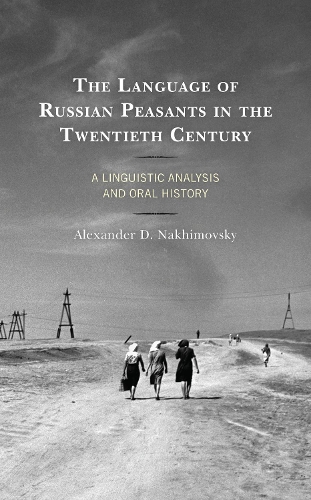
The Language of Russian Peasants in the Twentieth Century: A Linguistic Analysis and Oral History
(Hardback)
Available Formats
Publishing Details
The Language of Russian Peasants in the Twentieth Century: A Linguistic Analysis and Oral History
By (Author) Alexander D. Nakhimovsky
Bloomsbury Publishing PLC
Lexington Books
28th October 2019
United States
Classifications
Professional and Scholarly
Non Fiction
Historical and comparative linguistics
491.7700904
Physical Properties
Hardback
226
Width 159mm, Height 234mm, Spine 19mm
485g
Description
The Language of Russian Peasants in the Twentieth Century: A Linguistic Analysis and Oral History analyzes the social dialect of Russian peasants in the twentieth century through letters and stories that trace their tragic history. In 1900, there were 100,000,000 peasants in Russia, but by mid-century their language was no longer passed from parents to children, resulting in no speakers of the dialect left today. In this study, Alexander D. Nakhimovsky argues that for all the variability of local dialects there was an underlying unity in them, which derived from their old shared traditions and oral nature. Their unity is best manifested in word formation, syntax, phraseology, and discourse. Different social groups followed somewhat different paths through the maze of Soviet history, and peasants' path was one of the most painful. The chronological organization of the book and the analysis of powerful, concise, and simple but expressive language of peasant letters and stories culminate into an oral history of their tragic Soviet experience.
Reviews
Pre-1917 almost all Russians were peasants. Nakhimovsky musters difficult-to-access sources to prove a thesis: despite geographical differences, peasants had nation-wide speechways that survived into the first Soviet decades. But confronting collectivization, wars, large-scale migration into cities, mass education, and media, ex-peasants adopted standard-language usage and Soviet jargon, first superficially and haltingly, later more thoroughly. Linguists and political scientists will also appreciate the explication of urban substandard usage (prostoreie), remarkably uniform throughout the Russian-speaking world. -- Wayles Browne, Cornell University
Until recently, most Russians were peasants, yet we still know sadly little about the world they lived in, and about their actual experience of the many catastrophes of the last century. Nakhimovsky writes clearly and with deep insight. Nothing I have read gives me such a vivid understanding of the world of the Soviet peasant, of the language they used, of how they thought and felt. This study also throws new light on the depiction of Russian peasants by such writers as Tolstoy and Chekhov. -- Robert Chandler, English Translator of Andrey Platonov's "The Foundation Pit" and "Soul: And Other Stories"
While Russian literature was endlessly adored by literati of many cultures its most significant parts were seldom acknowledged or even mentioned. The language of the mass of Russian people i.e. Russian peasants (in the 1940s still 9/10 of them) its capacity to develop reflecting history was usually lost. Professor Nakhimovsky is to be congratulated for the way he brought up Russian language actually spoken by Russian people, its remarkable flexibility, the way it followed the daily life as much as the massive drama of what Russia's life was. Even the curses typical of the way Russian have expressed themselves daily have often more vigour than fine delicacy of others. -- Teodor Shanin, University of Manchester & Moscow School of Social and Economic Sciences
Author Bio
Alexander D. Nakhimovsky is associate professor and director of the linguistics program at Colgate University.
